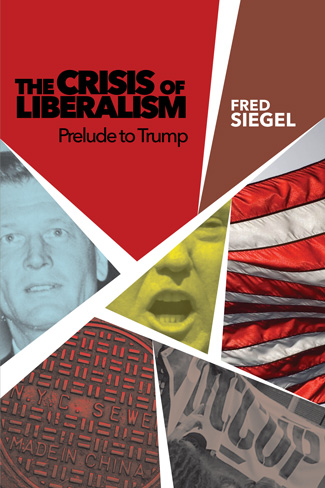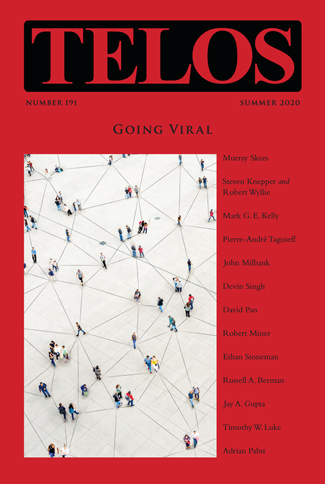Worse than the concrete fear of some life-threatening reality, such as in the past the Spanish flu or today COVID-19, is the anxiety nourished by the imagination of terror. This is the business of the modern prophets of the apocalypse, who usually show up in the guise of science. They lend support to the great religion-substitute of an infinite environmentalist worry, with which the Party of Prohibitions exploits the guilty conscience of an affluent society. Instead of “What can I hope for?”—a question for which one used to expect an answer from Christianity—they ask: “What must I fear?” This accords to the presumed wisdom of children who want to carry out a world tribunal to save the earth.
|
Now available for pre-order from Telos Press Publishing: The Crisis of Liberalism: Prelude to Trump, by Fred Siegel. Pre-order the paperback edition today in our online store and save 30% off the list price. Offer expires 9/30/20. Also available now in Kindle ebook format. Release dates: October 1, 2020 (paperback), September 15, 2020 (ebook).
by Fred Siegel In The Crisis of Liberalism: Prelude to Trump, Fred Siegel leverages New York City to uncover the key political conflicts and social contradictions in American liberalism over the last century. This wide-ranging collection of essays critically recounts how passionate intellectual debates over how to realize “the good life” in the modern city emerged from the writings of early progressive “thought leaders,” who envisioned a new educated elite capable of enlightened democratic governance. The flaws in this approach, as Siegel shows, expressed themselves most floridly in John Lindsay’s New York, whose flashy limousine liberals were a preview of today’s politically correct gentry liberalism. Its cultural programs over the past half-century repeatedly failed the downtrodden underclass and alienated middle-class New Yorkers trapped in economic stagnation. By neglecting voters’ real concerns over illegal immigration and China’s emerging threats, globalist technocratic liberals ultimately set the stage for Donald Trump’s angry nationalist demand to put “America First.” Over the last fifty years, the West has witnessed a continuous decline in the quality of the state and its activities, along with a cultural deterioration of the public sphere. All OECD (Organization for Economic Co-operation and Development) countries have also undergone a massive dichotomization of private property ownership: An ever-smaller fraction of the population owns a growing share of all non-public assets. According to some estimates, the richest one percent holds 70 to 80 percent of all global private property, while an increasing number owns nothing and is excluded from decent incomes and the means to live a normal family life. The following essay originally appeared in Valeurs actuelles on April 2, 2020, and is published here in English translation by permission of the author. Translated by Russell A. Berman.
It has already been said but it is worth repeating: the health crisis is ringing (provisionally?) the death knell of globalization and the hegemonic ideology of progress. To be sure, the major epidemics of antiquity and the Middle Ages did not need globalization in order to produce tens of millions of dead, but it is clear that the generalization of transportation, exchanges, and communications in the contemporary world could only aggravate matters. In the “open society,” the virus is very conformist: it acts like everyone else, it circulates—and now we are no longer circulating. In other words, we are breaking with the principle of the free movement of people, goods, and capital that was summed up in the slogan “laissez faire,” i.e., let it go, let it pass. This is not the end of the world, but it is the end of a world.
Of course, in a sense, they were right because Communism ended and so did the Communist states in Russia and Eastern Europe. Yet the death of those regimes is in no way an argument for the death of statehood itself. The state is the expression of sovereignty, and sovereignty is the ability of national communities to decide their own fates. Such independence is far from obsolete, and certainly not for the countries on the eastern flank of the European Union. After years of Russian occupation, they have regained their state sovereignty. They will continue to insist on it, and rightly so. |
||||
|
Telos Press Publishing · PO Box 811 · Candor, NY 13743 · Phone: 212-228-6479 Privacy Policy · Data Protection Copyright © 2024 Telos Press Publishing · All Rights Reserved |
||||


 History is always open, as everyone knows, and this makes it unpredictable. Yet in certain circumstances, it is easier to see the middle and long term than the near term, as the coronavirus pandemic shows well. For the short term, one surely imagines the worst: saturated health systems, hundreds of thousands, even millions of dead, ruptures of supply chains, riots, chaos, and all that might follow. In reality, we are being carried by a wave and no one knows where it will lead or when it will end. But if one looks further, certain matters become evident.
History is always open, as everyone knows, and this makes it unpredictable. Yet in certain circumstances, it is easier to see the middle and long term than the near term, as the coronavirus pandemic shows well. For the short term, one surely imagines the worst: saturated health systems, hundreds of thousands, even millions of dead, ruptures of supply chains, riots, chaos, and all that might follow. In reality, we are being carried by a wave and no one knows where it will lead or when it will end. But if one looks further, certain matters become evident. 






